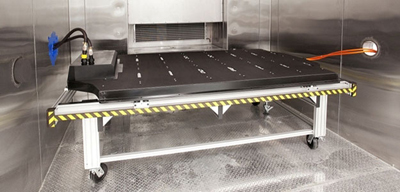
Model S reportedly might be profitable at just 20,000 units a year.

No one's ever put "Tesla Motors" and "profitable" in the same sentence, but the electric-roadster maker's technology chief says its Model S sedan may have a chance at operating in the black because of its relatively inexpensive batteries.
The Model S, which is slated to debut next year with a $57,000 price tag before any tax incentives, may make money for the Palo Alto, Calif.-based company because its lithium-ion battery pack (above) will cost less in dollars per kilowatt hour than of the Nissan Leaf electric car's pack, Bloomberg News reported, citing an interview with Tesla Chief Technology Officer J.B. Straubel.
Because of such lower costs, the Model S may be profitable at a production rate of about 20,000 units per year, compared to the approximately 500,000 units annually Nissan and partner Renault SA have estimated would be necessary to make the Leaf profitable, according to the wire service.
While Straubel declined to disclose battery costs, the Model S's pack will cost about $200 per kilowatt hour, or about a quarter of the Leaf's, Bloomberg reported, citing Martin Eberhard, a Tesla founder and the company's former CEO. Tesla representatives did not respond to a request for comment from Green Car Advisor Tuesday.
Tesla, which has sold about 1,400 of its $109,000 roadsters, went public last year but has never been profitable. The company said in November that its third-quarter loss widened to $34.9 million from a $4.6 million loss a year earlier, as the company ramped up research and development spending while boosting administrative costs as it took title of its new factory in Fremont, Calif.
Revenue was down 31% from a year earlier, though up 10% from the second quarter. Still, Tesla said last month that by the end of the third quarter it had received 3,000 reservations for the Model S - or about double the number of Roadsters on the road - and that the sedan will be designed to accommodate rapid battery swaps.
Whether that will make the Model S profitable remains to be seen.
Dr. Menahem Anderman, founder of electric-vehicle battery research firm Advanced Automotive Batteries, estimated that the second-largest of the Model S's three optional battery packs - one capable of delivering up to 230 miles of range on a single charge, accortding to Tesla - will cost about $35,000 at a production rate of 20,000 units per year.
Comparatively, the much smaller battery pack in the Leaf, which retails at $32,780, will cost about $14,000 at 50,000 units a year, Anderman said.
Meanwhile, John Gartner, senior analyst at Pike Research, estimates that the price of automotive-grade lithium-ion cells is falling by between 8% and 10% a year, which suggests that electric vehicles will have a better chance achieving profitability as time goes on.
That said, Anderman, who doesn't foresee any substantial drop in the Model S's battery pack costs until the end of the decade, added that both Nissan and Tesla may have trouble hitting the sales numbers necessary to bring battery costs down because customers will be wary of having to replace their cars' expensive batteries after just a handful of years.
"Battery reliability, durability and safety are more important than price," said Anderman. "When the experienced producers (such as) Sanyo and Samsung make a battery for $600 per kilowatt hour that lasts for 10 years and have near-zero reliability incidents, it will be a much more attractive product than a three-to-five-year Tesla battery or a five-to-six-year Leaf battery."
Written by Danny King